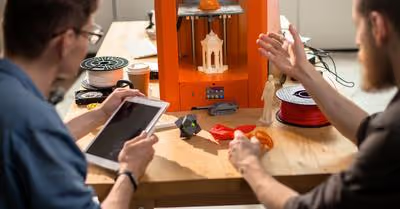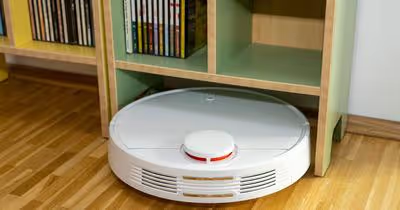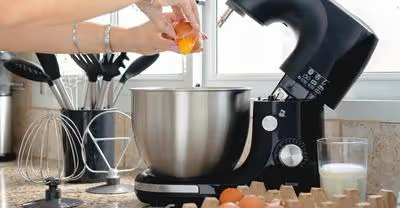Table of Contents
Choosing Your Smart Home Central Hub
One of the most crucial parts of a successful smart home is the central control system, commonly known as the hub. This is essentially the brain of your smart home. Without it, the virtual assistant or smart speaker won't understand whatever you say and won't be able to interpret whatever information you're trying to relay.
Generally, almost all smart gadgets work similarly. However, the gadgets have servers or hubs that relay the signal before communicating to your smart gadget. In other words, the hub is the brain of your smart home. It's the go-between for other smart devices and is where the intelligence is. The hub is what enables smart devices to work by providing routines, voice controls, automation, facial recognition, and many more.
How a Smart Hub Works
When it comes to smart homes, they generally relay information from the smart hub to the smart devices through wireless radio transmitters and receivers. These transmitters are exactly what connects your home internet network and allow the smart hub to relay the required messages and information to your smart devices. Whether you're using Zigbee, Wi-Fi, Bluetooth, or Z-Wave, these are just wireless transmitters that are used to relay information from the hub to the smart device or to your mobile gadget.
The smart hub acts as the go-between and is essential in sending and receiving communication back and forth from the smart devices. Whichever wireless radio you choose to use, smart hubs are essential in allowing you to arrange your smart devices by room, floor, type, and even function. This is possible because most hubs enable you to arrange the devices and control them the way you like. Similar to a TV remote control, you can just push the button to turn on or off a light bulb, to adjust the temperature on your thermostat, or to lock your door.
When using more sophisticated hubs, you can configure groups of simultaneous controls and control multiple devices at once or from one point. With such a hub, you can either turn on or off the devices as you see fit. This is basically where the real meaning of smart home sets in. Having such a smart hub can enable you to control various parts of your home from anywhere around the world. These hubs can also trigger automatically through sensors or by a simple push of a button on your smartphone or mobile device.
So depending on the smart hub that you have, your smart devices, and the technical aspects of your smart devices, your home can have some sort of wizardry just like you've been seeing in sci-fi movies. You should, however, keep in mind that smart hubs require regular troubleshooting as they can at times fail or even require customizing codes.
All in all, you should always remember that your smart home can have a variety of hubs. For instance, you can use Google Home to connect various Google servers, Philips hub to connect Philips Hue bulbs, and so on. On the other hand, you can go for a universal hub such as Z-Wave that is compatible with a variety of smart home devices though you may still need some of the devices' servers for them to work perfectly.
What's the Importance of Smart Hubs?
A smart hub is of great importance if you want your smart home devices to work perfectly and for everything to work together. For instance, if you like to control various parts of your home through talking, you should have Alexa in place. But what if your smart light doesn't work with Alexa? Well, this could present real issues. Fortunately, most smart devices understand this issue and try to ensure that their devices work with as many servers and assistant devices as possible.
That being said, you should double-check and ensure that the smart devices that you buy for your home are not only compatible with the type of hub you choose but can also communicate with your servers. More important, you should pay close attention to the way they interact to avoid chances of lag or points of failure. You should also ensure that your smart devices do not misinterpret data. There are other situations where the manufacturer of your device may go out of business or change access rights and your smart device may become redundant. It's, therefore, important to stay informed and ensure that your devices are updated accordingly.
Choosing Your Virtual Assistant
Another important part of your smart home is the virtual assistant. Just like in sci-fi movies, virtual assistants play important roles in the efficiency of your smart home and smart devices. These are essentially computer interfaces that are activated with a keyword or password to perform a variety of tasks such as receiving commands, performing tasks, and enabling communication.
Virtual assistants are meant to make our lives easier. They can perform several pre programmed tasks, and do what you command them to do. That's not all; virtual assistants can keep you company, break language barriers, wake you up on time, remind you of a loved one's birthday or anniversary, and more importantly, keep your hands free. In essence, virtual can help you with several chores and fully automate your home.
But because there are several well-designed virtual assistants out in the market, choosing the best can be a bit of a headache. So if you're confused on what to go for, let's make it a lot easier for you.
Amazon's Alexa
Buying Amazon's Echo product is certainly your best bet if you want to quickly get started with a smart home. These products are not only easy to set up but are also easy to use. Some of these products are among the cheapest smart home controllers in the market. Better still, Alexa has more than 10,000 skills, 3rd party capabilities, and is perhaps the most supported smart home hub.
We have to note that there are times when Alexa may have difficulties responding to your commands and this can be a major issue. Again, Amazon doesn't take responsibility for third-party devices that work with Alexa, so it remains your responsibility to find smart devices that are compatible with Alexa.
Apple's Siri
This is one of the most secure virtual assistants, especially if you're looking for a smart home device that has privacy in mind. This is because Apple works directly with smart devices and home accessory manufacturers to ensure that data transferred between devices are encrypted and secure. Integrating Siri and Apple's mobile devices is much easier but this can also be a downside given that Siri is exclusive to Apple products.
Google's Assistant
In terms of artificial intelligence, Google's assistant is generally smarter and much better than Siri or Alexa. This is because it's powered by the brains of Google search, so you have the advantage of finding the right solutions to a wide array of questions. The fact that Google collects data to make your searches faster, more relevant, smarter, and more useful to you makes it a lot easier for Google's Assistant to know what you need.
On the contrary, Google's Assistant isn't as compatible with several devices as Alexa. While Google's Assistant is smarter than other virtual assistants, it still has trouble when it comes to appropriately respond to some requests.
Setting Up a Smart Home
Whether you're using Z-Wave, ZigBee, Insteon, or X10, these wireless protocols are fundamental for smart home communication. Most of these wireless protocols work directly with smart devices manufacturers to ensure that these protocols are compatible with most devices.
But before looking at how to set up a smart home, let's highlight some smart home devices and how to use them.
Smart Lighting
If you've always been interested in living in a smart home, the lighting system should be one of your main priorities. Imagine being at home watching your favorite movie but the lighting system in your living room isn't ambient. What do you do? Well, smart lighting can enable you to control your home's lighting system with ease and to your liking.
Keep in mind that many smart lighting systems can work excellently without a central hub and can still interact with other smart home devices or elements. For example, bulbs such as TP-Link, and LIFX can communicate via Bluetooth or Wi-Fi. Others such as Cree, Philips Hue, and Sengled Element rely on ZigBee, which must be bridged to Wi-Fi.
You'll control most of these smart bulbs through an app on your smartphone or mobile device. You can also program the lighting systems to your preferred colors, scenes, and schedules. If your home's lighting systems are controlled by wall switches, it would be essential that you migrate to smart switches. Most of these switches can be operated via Wi-Fi and don't necessarily require a smart hub.
Smart Thermostat
If you've been looking for a smart home device that can perfectly deliver comfort and energy savings, then few things can match what a smart thermostat offers. In addition to creating your required heating and cooling system based on when you expect to be at home and the temperatures that you want, a smart thermostat can ensure that your HVAC system only works when required, which is a great way of lowering your energy bills.
Smart thermostats are designed with sensors so that they can control the temperatures of the rooms you occupy most frequently. So instead of just triggering the temperatures of every room in your home, they can concentrate on a particular room.
Some of the best thermostats include the Ecobee4 and thermostats from Nest Labs. They have sensors and can be integrated with several smart speakers and devices.
Smart Speakers
The main aim of a smart home is to enhance your comfort. This is generally through the voice commands that you issue to the smart devices and this will only be possible if you have a smart speaker.
Whether you link the smart speaker to your smart lighting system or to your smart thermostat, you need to have a smart speaker to help you issue commands to these smart home devices. Some of the market leaders in the smart speakers' category include Google Home series and Amazon Echo series.
Smart speakers have been widely embraced by manufacturers of most smart home devices and have become some sort of hubs in their own rights. With an appropriate smart speaker, you can now control almost any smart home device. From your smart thermostat, smart bulbs, home security cameras, and many more.
Home Security Cameras
The safety and security of our homes are of great importance to us. When it comes to your home security camera, you should go for a quality product that will ensure that you keep a watchful eye on what's happening in and around your home whether you're there or not. While outdoor models can help you detect and catch intruders and hopefully discourage them from coming to your home, indoor models can help you monitor your children and pets.
Camera models from Netatmo, Ring, and Maximus are among the best. They can be incorporated in various places within your home including on doorbells. Such doorbell cameras will not only monitor your porch but will also allow you to interact without you approaching the door.
Multi-room Audio Systems
There are several modern multi-room speakers that are largely self-contained to allow you to drop speakers in various rooms within your home. These products can also enable you to stream your own music collection from online platforms such as Spotify.
Models such as HEOS, Sonos, and Yamaha are among the best. They also have soundbars that are essential in improving your TV and movie-watching experience. You can control your audio system from your smartphone.
Smart Smoke and Carbon Monoxide Detectors
In addition to having annoyingly loud alarms, traditional smoke and carbon monoxide detectors are dumb devices. Although smart smoke detectors have loud alarms too, they will instantly send alerts to your phone or to anyone else you authorize as a contact in case any danger is detected.
Most of these products also have emergency lights to help you find your way out of a smoke-filled room. Some of the best products out there include Nest Protect and Roost.
Most of these smart home devices are available online, at home improvement stores, and electronic stores. But before spending your money on any smart home device, you should ensure that the technology associated with the devices is compatible with the smart hub you're planning to use.
You can automate pretty much any electronic device. While it's possible to push the home automation thing to the next level if you have resources just like Bill Gates did, there are a few essential areas of your home that you should automate. Well, this is of great importance if you want just a modest level of automation to your existing home appliances and features.
When it comes to setting up a smart home, you can design as much or as little home automation as you want. The best thing to do is to look at the tasks you routinely do around your home and find the best way to automate them.
So How Exactly Does Home Automation Work?
Now that you know some of the best smart home devices that you can incorporate in your home, it's now a lot easier to get started. In terms of how a smart home works, it is technically a network of hardware that communicates with each other to make your home life much better. It also involves using electronic interfaces that work by integrating everyday devices via the internet to make your life easier and a lot better.
Most smart devices are not only connected to the internet but have sensors and can be controlled from your smartphone from anywhere around the globe. With an automated home, you can seamlessly perform normal activities such as turning lights on and off, locking the front door, and controlling temperature from anywhere around the world.
A standard smart home system should have three main components: controllers, sensors, and actuators. Sensors play an integral role in monitoring things such as motion, humidity, light, and temperature. They can help you adjust the parameters of your smart devices to your preferences.
Controllers revolve around devices such as your smartphone, computers, laptops, tablets, and many more. They send and receive messages regarding your smart devices and their statuses. Controllers are basically the devices that allow you to control and monitor your smart home system.
Actuators control the main function and mechanism of your smart home system. They include devices such as light switches and motorized valves. You can activate and control them by issuing commands from a central controlling unit.
Benefits of a Smart Home
Overall, the main benefit of a smart home is to ensure that your home's functions are streamlined. Here are more benefits.
Control - Smart home devices are designed to primarily give you more and better control of various parts of your home. You can turn on and off the lights, open the front door or garage, turn the thermostat, and supervise your home remotely from anywhere.
Comfort - Smart devices are integral in creating a more comfortable atmosphere. From intelligent and adaptive lighting to temperature and sound, you can make your home and your life more comfortable and enticing.
Energy-saving - Using smart bulbs and thermostats will save energy and cut down on such costs. There are also water automation devices that can help you monitor your home's water usage.
Convenience - Smart home devices perform their functions automatically, which is important in enhancing convenience. Again, most smart devices are compatible with each other.
Safety - Every homeowner requires a safer and secure abode. There are smart home devices that will enhance the safety of your home. Video surveillance, motion sensors, alarm functions, and automated lighting can make your home securer.
Peace of Mind - A smart home offers the right peace of mind that any homeowner would be proud of. In addition to seeing what is happening from anywhere, you can remotely control various parts of your home such as locking the front door.
Bottom Line
In today's busy world and tight schedules, home automation is a great way of making things a lot easier for you. As futuristic as fictional automated smart homes might seem, they are becoming a reality and a lot easier to incorporate.
With all the above-described information, the best thing to do is to find the best smart home devices and products for your home. You can choose how your smart home devices interact with each and how you can control those interactions. If you're on a tight budget, you can begin with basic smart home features such as smart bulbs, video surveillance, smart locks, and alarm systems before upgrading to more complicated features.
Recent Articles

















